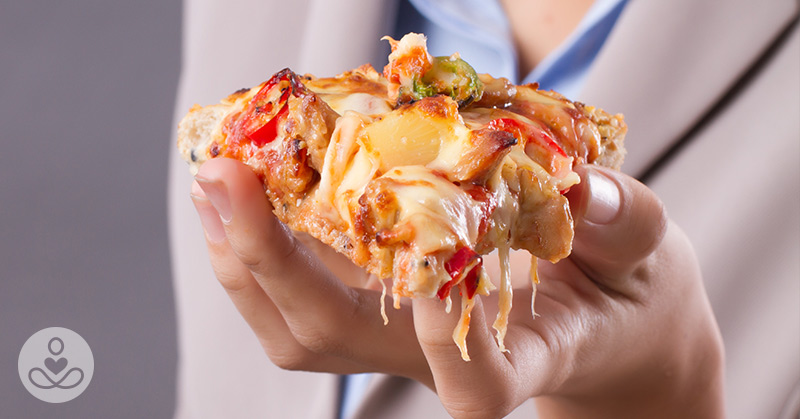There are multiple ill effects from lack of sleep, and there is one we often forget about: weight gain.
People often (and rightfully) blame a poor night’s sleep on too much caffeine, blue light from phones and TVs in the bedroom, anxieties from life, and overall insomnia. Some people like students and parents stay awake through the night to either binge-study or take care of a child. On average, people are sleeping less than they have just 13 years ago, and many are feeling its negative effects. [1]
The Results of Missed Sleep
Whether it’s a long-term case of insomnia or a single all-nighter, everyone is familiar with the effects of too little sleep:
- Lack of alertness
- Impaired memory
- Stress and irritability
- Low energy [2]
But could there be something else this lack of sleep is doing to us? We tend to forget, but a lack of sleep can also stimulate hunger. A 2016 study took a look at this unique kind of hunger exhausted people feel.
The Trial: How Many Extra Calories are Eaten When Tired?
The study was published in the European Journal of Clinical Nutrition, the goal was to determine how many extra calories are eaten by sleep-deprived people. [3]
Health experts often recommend quality sleep along with exercise and healthy eating as methods to maintain and lose weight. Previous studies have also connected inadequate sleep with obesity and type 2 diabetes. The idea is that poor sleep actually affects how well our hormones related to satiety work, leading to higher caloric intake and weight gain. [4]
This is the first trial to calculate the caloric effect of not enough sleep.
In order to achieve to this goal, the researchers analyzed the results of 11 previous studies on the topic of calorie consumption and “partial sleep deprivation”—which means the subject was awake for part of the night, but not the entire night. This can affect sleep quantity and/or quality.
Overall, the studies included about 172 people from ages 18 to 50, male and female, and ranging from a healthy weight to obesity. Each of the studies included a control group who slept adequately, about 7 to 12 hours a night. The sleep-deprived groups charted about 3½ to 5½ hours in bed at night.
The Results: The Number of Extra Calories
The study found the sleep-deprived groups consumed on average 385 additional calories per day. That’s the caloric equivalent of four and a half slices of bread. Alternatively, that equates a plate of French fries or a cup of rich chocolate ice cream, because let’s be honest, that’s what most of us crave at the end of an exhausting day.
To put that into context, 385 calories is about the fifth of the energy needs of a moderately active 30-year-old woman. That’s not all, it turns out that there was a pattern as to what made up these calories.
“Moreover, people proportionally consumed more fat and less protein,” says G.K. Pot, a lecturer in the Diabetes & Nutritional Sciences Division at King’s College London, and also an associate professor at Vrije University Amsterdam.
The carbohydrate consumption in both groups was about the same.
Why Do We Eat More When We’re Tired?
As alluded to earlier, studies show that missing sleep affects hormones relating to hunger, like leptin and ghrelin. Ghrelin increases appetite while leptin decreases it. When the body is tired, the ghrelin levels spikes and the leptin levels fall, resulting in hunger.
Additionally, tired people tend to overeat because they’re seeking pleasure. The urge to binge-eat is stronger when people are exhausted. Sleepiness can put them on edge and they try to satisfy that anxiety with food.
This phenomenon can happen because missing sleep starts a physical reaction that raises the blood levels of a lipid called endocannabinoid. The brain responds to this action similar to how it reacts to marijuana, making eating more pleasurable. It also increases cravings for sugar and fats, like in cookies, candy, and chips. [5]
Skipping Sleep and Gaining Weight
Another finding from this study found staying up later doesn’t burn the extra calories. This highly suggests sleep-deprivation over a long period of time could result in weight gain. However, all of the trials involved lasted no longer than two weeks, so the long-term results of how/if these extra calories lead to weight gain are technically inconclusive. Though one could easily speculate.
The good news is these researchers have started a study with people with chronic sleep conditions to test this theory.
“We need to do more research into sleep as a possible remediable risk factor for obesity and possibly other cardio-metabolic diseases like diabetes,” says Pot, “especially in today’s society in which trends are showing that people sleep less.”
In the end, many of us probably know we don’t get enough sleep, but a little reminder never hurts.
Sources
- Are U.S. adults reporting less sleep?: Findings from sleep duration trends in the National Health Interview Survey, 2004–2017 https://academic.oup.com/sleep/advance-article-abstract/doi/10.1093/sleep/zsy221/5185637?redirectedFrom=fulltext
- What Happens to Your Body When You Don’t Get Enough Sleep https://health.clevelandclinic.org/happens-body-dont-get-enough-sleep/
- The effects of partial sleep deprivation on energy balance: a systematic review and meta-analysis https://www.nature.com/articles/ejcn2016201
- Associations between sleep loss and increased risk of obesity and diabetes https://www.ncbi.nlm.nih.gov/pmc/articles/PMC4394987/
- The Connection Between Sleep and Overeating https://www.sleepfoundation.org/articles/connection-between-sleep-and-overeating

